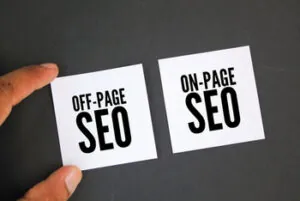In today’s competitive digital landscape, merely having a website is insufficient. Your site has to be optimised for search engines to attract organic traffic and achieve higher rankings on search engine results pages (SERPs). SEO, divided into on-page and off-page strategies, plays a pivotal role in this optimisation process. Both aspects are vital, yet they function differently to enhance your website’s visibility. In this article, we’ll explore the difference between on-page and off-page SEO, identify signs that indicate a need for optimisation, and provide practical tips to improve your SEO efforts effectively.
On-Page Versus Off-Page SEO Factors
Understanding the difference between on-page and off-page SEO ranking factors is essential for developing a balanced and effective SEO strategy. While both are crucial for improving search engine rankings, they focus on different optimisation aspects.
On-Page SEO

- Content Quality: Creating informative, engaging, and relevant content that aligns with the expectations of your patients.
- HTML Elements: Optimising title tags, meta descriptions, headings, and other HTML elements.
- Internal Links: Establishing a logical structure within your website through internal linking.
Off-Page SEO
Off-page SEO refers to all steps taken outside your website to improve visibility and authority. It focuses on external factors that influence your site’s reputation, such as:
- Backlinks: Acquiring high-quality links from other reputable websites.
- Social Signals: Leveraging social media platforms to increase your content’s reach and engagement.
- Local SEO: Optimising your presence for local search queries.
Signs You Need To Optimise Your On-Page SEO
Good on-page SEO is reflected in your site’s relevance and usability, directly impacting your search engine rankings. If you notice the following signs on any web page you have, it may be time to focus on optimising your on-page SEO elements:
- Declining Search Rankings: If your website’s search rankings have dropped or stagnated, it may indicate that your on-page SEO needs attention. Search engines regularly upgrade their algorithms, and what once worked may no longer be effective.
- High Bounce Rates: A high bounce rate occurs when patients leave your site after viewing only one page. This can signal issues with your page content, user experience, or site navigation.
- Low Dwell Time: Dwell time refers to a visitor’s time on your page before returning to the search results. Patients spending very little time on your site may indicate that your content isn’t engaging or relevant enough.
- Ineffective Meta Tags: Meta tags, including titles and meta descriptions, are vital in on-page SEO. If these tags are missing, poorly written, or not optimised with relevant keywords, your pages may not rank as well as they could.
- Poorly Optimised Internal Links: Internal links help search engines grasp the structure of your site and distribute link equity. If your internal linking strategy is weak or non-existent, it can hinder your site’s ability to rank well.
- Outdated Or Thin Content: Outdated, thin, or lacking depth can negatively impact your rankings.
- Non-Optimised Page Titles And Headers: Page titles and headers are essential for user experience and SEO. If your page titles and headers are not descriptive or do not include relevant keywords, your pages may not perform well in the SERPs.
- Missing Or Ineffective Alt Text For Images: Alt text helps search engines gauge the content of your images and enhances accessibility for users with disabilities. If your images are missing alt texts or have ineffective descriptions, it can hinder your SEO efforts.
- Poorly Structured URLs: Clear and descriptive URLs enhance usability and help search engines understand your page content. If your URLs are long, complicated, or not keyword-optimised, it can affect both the user experience and search rankings.
- No Clear Calls To Action (CTAs): Effective CTAs guide users towards desired actions, such as booking a complimentary consultation or signing up for a newsletter. If your pages lack clear and compelling CTAs, they can impact user engagement and conversions.
- Inconsistent Content Formatting: Consistent formatting improves readability and the user experience. If your content is poorly formatted or lacks a clear structure, it can affect how users interact with your site.
- Insufficient Keyword Optimisation: Effective keyword optimisation involves strategically using relevant keywords throughout your content, title tags, and meta descriptions. If your pages lack keyword optimisation or are overstuffed with keywords, it can affect your search rankings.
Signs You Need To Optimise Your Off-Page SEO
While on-page SEO focuses on elements within your website, off-page SEO involves strategies and activities outside your site that impact its search engine rankings. If you observe any of the following signs, it may indicate a need to enhance your off-page SEO efforts:
- Low Domain Authority: Domain authority (DA) measures your website’s credibility and strength on search engines. If your DA is low compared to competitors, it may signal that your off-page SEO strategies need improvement.
- Lack Of High-Quality Backlinks: Backlinks from authoritative and relevant sites are crucial for off-page SEO. If your site lacks high-quality backlinks, it may struggle to achieve higher search rankings.
- Poor Social Media Engagement: Social media platforms are a key component of off-page SEO. If your social media engagement is low, it may indicate that you need to strengthen your off-page SEO efforts.
- Weak Local SEO Performance: Local SEO is an essential off-page factor for businesses targeting local customers. If your local SEO performance is weak, it may indicate that you need to optimise your Google Business Profile and other local listings.
- Limited Content Distribution: Effective content distribution helps build backlinks and drive traffic. If your content is not widely shared or distributed, it may hinder your off-page SEO efforts.
- Insufficient Industry Influence: Influencing your industry can boost your site’s authority and visibility. If your site is not seen as a leader or expert in your niche, it may be time to enhance your off-page SEO efforts.
- Ignoring Competitor Analysis: Competitor analysis helps you understand your competitors’ off-page SEO strategies and identify areas for improvement. If you do not analyse your competitors’ tactics, you may miss opportunities to enhance your off-page SEO.
- Lack Of Content Marketing Efforts: Content marketing can drive traffic and build backlinks to your site. If your content marketing efforts are minimal or nonexistent, it may impact your off-page SEO.
How To Improve Your On-Page SEO
Optimising on-page SEO is essential for improving your search engine rankings and user experience. Here’s a comprehensive guide to effective strategies to enhance your on-page SEO:
Conduct Thorough Keyword Research
Keyword research is the foundation of on-page SEO. Determine all the relevant keywords and phrases that your patients are searching for. Utilise keyword research tools, including Google Keyword Planner, SEMrush, or Ahrefs, to know the high-traffic keywords with manageable competition. Insert these keywords naturally into your content, titles, and meta descriptions.
Optimise Title Tags
Title tags are crucial for both SEO and the user experience. Ensure that each page on your site has a unique, descriptive title tag that includes relevant keywords. Aim for compelling titles under 60 characters to avoid truncation in search results. A well-optimised title tag helps search engines understand the page content and improves click-through rates.
Enhance Meta Descriptions
Meta descriptions summarise your page content and appear in search engine results right below the title tag. Write engaging and informative meta descriptions that include target keywords and encourage potential visitors to click through to your site. Keep meta descriptions at around 155 characters to ensure they are displayed in full.
Improve URL Structure
A clear and descriptive URL structure helps search engines and users understand your page’s content. Use short, keyword-rich URLs that accurately reflect the page content. Avoid using complex or lengthy URLs with unnecessary parameters. Implement a logical hierarchy in your URLs to improve navigation and SEO.
Create High-Quality Content
Content is a primary part of on-page SEO. Focus on creating valuable, relevant, and engaging content that tackles the needs of your audience. Incorporate target keywords naturally and provide comprehensive information that answers users’ questions. Regularly update and expand your content to keep it fresh and relevant.
Use Header Tags Effectively
Header tags (H1, H2, H3, etc.) help structure your content and make it easier for users and search engines to understand. Use H1 tags for main headings and H2 and H3 tags for subheadings and sections. Incorporate relevant keywords into your headers to enhance SEO and improve readability.
Optimise Images With Alt Text
Images contribute to the user experience and can also impact SEO. Insert descriptive alt text in each image to help search engines understand the content. Include relevant keywords in your alt texts, but avoid keyword stuffing. Optimising images also involves compressing them to improve page load speed.
Improve Internal Linking
Internal links connect multiple pages within your site and help distribute link equity. Implement a strategic internal linking structure to usher website visitors to related content and enhance navigation. Utilise descriptive anchor text for internal links and ensure that important pages are easily accessible.
Implement Schema Markup
Schema markup helps search engines understand the context of your content and can enhance search results with rich snippets. It provides additional information about your business, products, and services, which can improve visibility and attract more clicks from search results.
Ensure Content Readability
Readable content is essential for engaging users and improving SEO. Opt for short paragraphs, bullet points, and headings to make your content more digestible. Avoid jargon and complex language, and ensure your writing is concise.
Use Relevant Keywords Strategically
Incorporate relevant keywords into various on-page elements, including title tags, meta descriptions, headers, and body content. Avoid keyword stuffing and focus on the natural, contextually relevant use of keywords. Conduct periodic reviews and updates to ensure your keyword strategy aligns with current search trends.
Optimise For User Intent
Understanding and addressing user intent is crucial for on-page SEO. Ensure your content meets the needs and expectations of your target audience. Analyse search queries and user behaviour to tailor your content and optimise for the specific intent behind users’ searches.
Incorporate High-Quality Outbound Links
Outbound links to authoritative and credible sources can enhance the credibility of your content. Link to high-quality websites and resources that provide additional value to your readers. Ensure outbound links open in a new tab to keep users on your site.
Regularly Update And Maintain Content
Keeping your content up-to-date and relevant is important for maintaining search rankings and user engagement. Review and update existing content regularly to ensure accuracy and freshness. Remove or improve outdated content to keep your site current and valuable.
Monitor And Analyse On-Page Performance
Harness analytics tools to track the performance of your on-page SEO efforts. Monitor metrics like page views, bounce rates, and conversion rates to evaluate the extent of success related to your optimisation strategies. Use insights from data analysis to make informed modifications and improvements.
How To Improve Your Off-Page SEO
Optimising off-page SEO is essential for boosting your website’s authority, visibility, and search engine rankings. Here’s a detailed guide to effective strategies to enhance your off-page SEO:
Build High-Quality Backlinks

- Guest Posting: Write guest posts for reputable blogs and industry sites to earn valuable backlinks.
- Content Syndication: Share your content on platforms where other sites can pick it up, generating backlinks.
- Engage In Forum Participation: Contribute to industry-related forums and communities, including links to your site where appropriate.
- Write Expert Roundups: Collaborate with industry experts to create roundup posts, often resulting in backlinks from their networks.
Leverage Social Media Platforms
Social media engagement can significantly impact your off-page SEO by increasing your website’s visibility and driving traffic. Implement these strategies:
- Regular Posting: Share valuable content on social media platforms to engage your audience and encourage shares.
- Community Engagement: Participate in relevant groups and discussions to build relationships and increase brand awareness.
Focus On Local SEO
For businesses targeting local customers, local SEO is crucial. Enhance your local SEO by:
- Optimising Google Business Profile: Ensure your Google Business Profile is complete and updated with accurate information.
- Building Local Citations: List your business’s contact information on all channels and ensure consistency in your NAP (name, address, and phone number) across all platforms.
Utilise Content Marketing
Content marketing not only helps with on-page SEO but also supports off-page efforts. Enhance your content marketing strategy by:
- Creating Valuable Resources: Develop eBooks, whitepapers, and infographics that provide in-depth information and attract backlinks.
- Hosting Webinars And Events: Conduct webinars and online events to engage your audience and earn backlinks from industry websites.
- Promoting Content Effectively: Share your content through email newsletters, social media, and industry forums to increase its reach and potential for backlinks.
Monitor And Analyse Backlink Profile
Keep an eye on your backlink profile to ensure the quality and relevance of your links. Use tools like Ahrefs or SEMrush to:
- Track Backlink Quality: Identify and disavow low-quality or spammy backlinks that may harm your site’s authority.
- Analyse Competitor Backlinks: Study your competitors’ backlink profiles to discover new opportunities for acquiring valuable links.
- Review Link Growth: Track the growth of your backlink profile and change your strategies based on performance.
Enhance User Engagement
Engaging with your audience can positively affect your off-page SEO. Increase user engagement by actively engaging with users who comment on your content on social media posts, fostering a sense of community.
Participate In Industry Events
Industry events, such as conferences and webinars, provide opportunities for networking and backlink acquisition. Consider:
- Sponsoring Events: Sponsor or speak at industry events to garner attention and earn backlinks from event organisers and participants.
- Networking Opportunities: Connect with other industry experts and explore collaboration opportunities that can promote backlinks.
- Event Coverage: Share your event experiences on your site and social media, and seek backlinks from event-related content.
Frequently Asked Questions
How often should I update my content for better SEO?
Regular content updates are important for maintaining relevance and improving SEO. Aim to review and refresh your content at least every six to twelve months. This includes updating outdated information, adding new insights, and ensuring content aligns with current SEO best practices.
What are core web vitals, and why are they important for SEO?
Core web vitals are a set of performance metrics that measure your website’s user experience, including page load speed, interactivity, and visual stability. They are important for SEO because they directly affect user satisfaction and rankings. Websites that meet these standards provide a better user experience and are more likely to rank higher in search results.
How does mobile friendliness impact SEO?
Mobile friendliness is a key factor in SEO, as search engines prioritise mobile-friendly websites in their rankings. A responsive design ensures your site performs well on mobile devices, providing a better user experience. Poor mobile performance can lead to higher bounce rates and lower search rankings.
What is the impact of page speed on SEO?
Page speed is a critical aspect of on-page SEO. Faster-loading pages improve the user experience and reduce bounce rates, positively influencing search engine rankings. Slow page speeds can lead to higher bounce rates and lower rankings, making optimising your site’s load times essential for better SEO performance.
Unlock Your Website’s Potential With Expert SEO Solutions
Understanding the difference between on-page and off-page SEO is crucial for developing a comprehensive SEO strategy that enhances your website’s visibility and performance.

For personalised guidance and expert assistance in implementing effective SEO strategies, contact Mediboost, Sydney, NSW, at 1300 163 058. Our experienced professionals will let you know if your suburb is available and help you optimise both on-page and off-page SEO, ensuring you achieve your digital marketing goals and drive your website’s success.
Sources:
Aryani, Diah, et al. “Comparative Analysis of On-Page and Off-Page White Hat Search Engine Optimization (SEO) Techniques on Website Popularity.” International Journal of Science, Technology & Management, vol. 4, no. 3, May 2023, pp. 527–33. https://doi.org/10.46729/ijstm.v4i3.815.
Fellinger, Lisa, and Despina Fronimaki. “Enhancing User Experience: Unveiling the Impact of Website Speed Optimisation on User Engagement.” Journal of Digital & Social Media Marketing, vol. 11, no. 4, Mar. 2024, hstalks.com/article/8350/enhancing-user-experience-unveiling-the-impact-of-.
Iqbal, Muhammad, et al. “Search Engine Optimization (SEO): A Study of Important Key Factors in Achieving a Better Search Engine Result Page (SERP) Position.” Sukkur IBA Journal of Computing and Mathematical Sciences, vol. 6, no. 1, July 2022, pp. 1–15. https://doi.org/10.30537/sjcms.v6i1.924.
Makrydakis, Nektarios. “SEO Mix 6 O’s Model and Categorization of Search Engine Marketing Factors for Websites Ranking on Search Engine Result Pages.” International Journal of Research in Marketing Management and Sales, vol. 6, no. 1, Jan. 2024, pp. 18–32. https://doi.org/10.33545/26633329.2024.v6.i1a.146.
Miklosik, Andrej, et al. “A Framework for Constructing Optimisation Models to Increase the Visibility of Organizations’ Information in Search Engines.” Information Research, 1 Mar. 2019, informationr.net/ir/24-1/paper808.html. Accessed 22 July 2024.
Nagpal, Mayank, and J. Andrew Petersen. “Keyword Selection Strategies in Search Engine Optimization: How Relevant Is Relevance?” Journal of Retailing, vol. 97, no. 4, Dec. 2021, pp. 746–63. https://doi.org/10.1016/j.jretai.2020.12.002.
Patel, Ravi S., et al. “Exploring the Effectiveness of On-Page SEO for Webpage Ranking: A Critical Study.” Communications in computer and information science, 2024, pp. 163–71. https://doi.org/10.1007/978-3-031-59107-5_11.
Perilli, Raubi Marie. “What Is Local SEO? Everything You Need to Know.” GoDaddy Blog, 25 Oct. 2019, www.godaddy.com/resources/skills/local-seo-guide. Accessed 22 July 2024.



